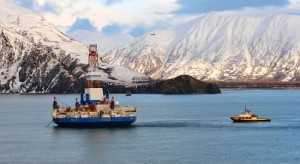Shell’s Kulluk drill rig has successfully been anchored in Kiliuda Bay, on the east side of Kodiak Island. It took the Kulluk about 12 hours to be towed 45 miles to the bay. It was re-floated a little after 10 p.m. last night.
Coast Guard Captain Paul Mehler described the mood in the incident command center when tugs were able to move the rig off the ocean floor.
“I won’t say I saw anyone high fiving,” Mehler said. “I’ll say there was certainly a sense of relief, but recognizing now we have a lot more work to do.”

The Coast Guard conducted an over flight this morning and saw no oil sheen. But some debris will have to be cleaned up from the shore near where the Kulluk was grounded. Mehler says a team is working to get a better picture of what that debris includes.
“The one thing I know that is going to need to be cleaned up is we have lifeboats on the beach,” Mehler said. “Those life boats will have fuel so that is, this morning when we came in, that became a higher priority, the beach assessment.”
The Kulluk had been grounded near Kodiak since New Year’s Eve.
Environmental groups have been closely monitoring the incident. Lois Epstein is Arctic program director for the Wilderness Society. She is relieved the grounding doesn’t appear to have caused major environmental damage.
“The big picture, however, is what this incident demonstrates in terms of Shells ability to go forward in the Arctic without serious problems,” Epstein said.
Epstein is in Washington DC, where she plans to meet with members of Congress to request oversight hearings on Shell’s Arctic operations.
“We think that’s essential,” Epstein said. “Shell’s had numerous problems, they haven’t been sufficiently looked at by Congress.
“This is a big step moving into the Arctic for drilling and what we’ve learned this past year is that it’s not trivial, it’s dangerous.”
Shell doesn’t know how long the Kulluk will stay in the Kiliuda bay. That will be determined by what assessment teams, including divers or underwater vehicles, find.
Listen to the full story
Annie Feidt is the broadcast managing editor at Alaska Public Media. Reach her at afeidt@alaskapublic.org. Read more about Annie here.





